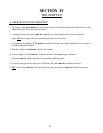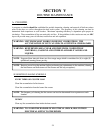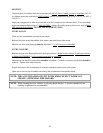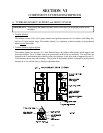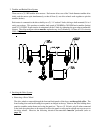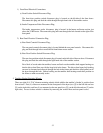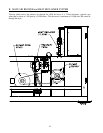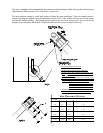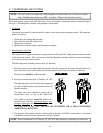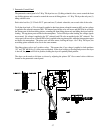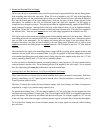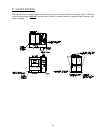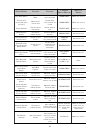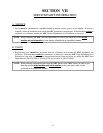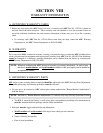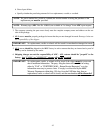
36
C. COMPRESSED AIR SYSTEM
NOTE: Current Production models use a Filter Regulator Assembly while Past Production models
used a Filter/Regulator/Lubricator (FRL) Assembly. (Refer to the illustrations below.)
The compressed air system of the ADS-464 dryer consists of a number of pneumatic pistons located throughout
the dryer, a Filter Regulator assembly, and pneumatic control panel.
1. Air Pistons
The pistons are actuated by solenoid and flow control valves that are under computer control. The pneumatic
pistons are used to:
• Tilt the dryer for loading and unloading.
• Open and close load and unload doors.
• Operate heat reclaimer.
• Operate the cool down damper and the intake air damper.
2. Filter Regulator Assembly
The compressed air supply to the dryer is connected into the 3/8-inch F.P.T. fitting located on the rear corner
of the lower heat console. This is connected to the Filter Regulator assembly which is located at the bottom
rear of the lower heat console section.
The Filter Regulator assembly performs three (3) functions;
a. The filter removes most solids and liquid particles from the compressed air stream and traps them in its
bowl where this waste can be readily removed through the drain valve at the bottom of the bowl.
The filter bowl should be cleaned monthly.
b. For dryers manufactured prior to February 26, 1997...
c. The regulator will maintain a nearly constant outlet air pressure of 80 PSI so that the dryer’s air pistons
will function normally despite upstream air pressure variation.
NOTE: Dryers manufactured as of February 26, 1997 have their pneumatic components pre-lubricated.
The lubricator injects a mist of oil into the compressed
air steam so that the pistons and solenoid valves will
function smoothly.
The oiling rate can be adjusted by turning the oil
adjustment screw on top of the lubricator.
Oil is added to the bowl should be refilled on a
monthly basis with any petroleum-based, non-
detergent lightweight oil (SAE 10/150 SSU) which
will readily break up into a mist. DO NOT USE SYNTHETIC OIL or OILS CONTAINING
ADDITIVES or SOLVENTS.



